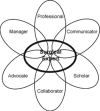Teaching and assessing surgical competence
- PMID: 17002841
- PMCID: PMC1964676
- DOI: 10.1308/003588406X116927
Teaching and assessing surgical competence
Abstract
Surgical competence and its assessment is one of the most hotly debated topics engaging the profession. In the current climate of diminishing working hours and shorter training, the surgical profession is having to address the complex issue as to how surgery as a craft specialty should be taught, and how to assess when an individual is competent within their chosen sphere as well as how that competence should be maintained. Internationally, there is political pressure upon the professional to achieve contracted activity to comply with political imperatives and, at the same time, to achieve a greater degree of specialisation. Within Europe, the working time directive has led to a shift system of rotas and this, along with a shorter overall period of training, has led to reduced time available to surgical trainees in which to learn their craft.
Figures
References
-
- The Royal College of Surgeons of England. Training the Trainers Manual: Learning and Teaching. London: RCSE; 2006.
-
- Canter R, Kelly A. A new curriculum: pre-piloting from January 2004. Ann R Coll Engl. 2005;87:42–4.
-
- Frank J, Jabbour M, Tugwell P, et al. Skills for the New Millennium. Report of the Societal Needs Working Group, Royal College of Physicians and Surgeons of Canada, 1996. Available at < http://rcpsc.medical.org/canmeds/canmed_e.html>.
-
- Evans AW, McKenna C, Oliver M. Trainee's perspectives on the assessment and self assessment of surgical skills. Assess Eval Higher Educ. 2005;30:163–74.
-
- Gallagher AG, Satava RM. Virtual reality as a metric for the assessment of laparoscopic psychomotor skills. Learning curves and reliability measures. Surg Endosc. 2002;16:1746–52. - PubMed
MeSH terms
LinkOut - more resources
Full Text Sources
Other Literature Sources




